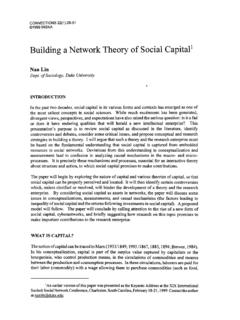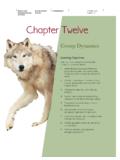Transcription of TheValueofWhoYouKnow: RevolvingDoor ...
1 The Value of Who You Know: Revolving DoorLobbyists and Congressional Staff ConnectionsJoshua M. McCrain 20, 2017 AbstractBuilding on previous work on lobbying and relationships in Congress, I propose atheory of staff-to-staff connections as a human capital asset for Capitol Hill staff andrevolving door lobbyists. Employing comprehensive lobbying disclosure data matchedto congressional staff employment histories, I find that the connections these lobbyistsmaintain to their former Hill coworkers primarily drive their higher relative value aslobbyists. Specifically, a one standard deviation increase in the number of connectionspredicts $360,000 in additional revenue during a revolving door staffer s first year asa lobbyist.
2 I also find that the indirect connections lobbyists maintain to legislatorsthrough knowing a staffer in a legislative office are of potential greater value than adirect connection to a Senator. By shedding additional light onto what individual-level traits the lobbying industry financially rewards, this paper makes an importantcontribution to the existing literature on lobbying and the revolving door phenomenon. Graduate Student, Emory University. Department of Political IntroductionAn uncomfortable fact of life in Washington is the regular transition of Capitol Hillstaffers into high paying lobbying jobs on K Street often for salaries orders of magnitudemore than what they earned on the Hill. The so-called revolving door creates, at thevery least, the perception of perverse incentives for Hill staffers and their bosses.
3 Furtherexacerbating the incentives to walk through the revolving door are the long hours and low paythat congressional staff face; a recent survey found that 46% of staffers reported they wouldlook for new work within a year because of the desire to earn more money (CongressionalManagement Foundation 2013; The Hill 2013).The lobbying industry a $3 billion industry in 2016 capitalizes on staffers persistentawareness of valuable outside options. The infamous Jack Abramoff, who stated almost90 percent of staff want to work on K Street, would remind staffers in meetings that theycould work at his firm once they left the Hill. After that, he said, they were already workingfor me (Abramoff, 2011, 94-95). Recent empirical work provides evidence that lobbyingfirms reward congressional staff-turned-lobbyists with higher salaries than their colleagueswithout Hill experience (Blanes I Vidal, Draca and Fons-Rosen, 2012).
4 In essence, if staffare not explicitly auditioning for high-dollar jobs once they have the attention of firms,their incentives for doing so are evidence indicates a competitive market for forward-looking congressional staff, sug-gesting a substantial monetary premium for a staffer with optimal Capitol Hill paper supports this claim, finding that with one or two years of the right kind ofadditional experience on Capitol Hill, the staffer can increase her expected revenue as alobbyist by $360,000 in her first year lobbying. After establishing the importance of staffconnections, I then measure the value of connections to legislators by determining whetherthe lobbyist previously worked with at least one staffer in the office.
5 I find that connectionslobbyists maintain to offices purely through their staff networks are potentially more valuablethan a direct connection to a Senator. A one standard deviation increase in theseindirect2legislator connections predicts $60,000 in additional yearly revenue when compared to onlypossessing adirectconnection to a Senator. Lobbying is a connections-driven business, andthose lobbyists with the most robust ties to congressional staff are a valuable asset to firmsand their results provide important context vis-a-vis existing empirical work, which hasshown strong evidence for the value of connections to legislators for revolving door lobbyists( , Blanes I Vidal, Draca and Fons-Rosen, 2012; Bertrand, Bombardini and Trebbi, 2014).
6 However, beyond who the lobbyist worked for on Capitol Hill, to date we know very littleabout individual-level attributes that the lobbying industry desires in who they hire. This isan important missing piece of the revolving door lobbying story, especially when consideringanecdotal evidence of certain staffers pulling in seven figure salaries in their first year off do firms and clients pay such high sums for former Capitol Hill staffers? Whatspecific traits and types of former Hill staffers do firms value and why? Does it only matterwho you used to work for? Employing a comprehensive dataset of lobbying disclosure reportsmatched to congressional staff employment histories from 2000-2016, I bring new data to bearon these , by emphasizing the importance of these lobbyists congressional staff expe-rience, I show that the focus on connections to legislators is, to a large degree, motivate why this is true, I argue for a theory of lobbying that emphasizes connections,but one where the specific type of connections most valuable for lobbyists are those thelobbyist maintains with their former Capitol Hill coworkers.
7 Time spent as a congressionalstaffer is a credentialing experience that provides the staffer the ability to cultivate uniqueprofessional experience and human capital assets (Salisbury and Shepsle, 1981, ). Pro-fessional networks are a specific asset of a congressional staffer s larger human capital onethat is particularly beneficial in the lobbying industry. As a result, clients are willing to pay1 This is up to 10 times what the staffer made as a Capitol Hill employee, where most senior staff earnaround $100,000 a year. for lobbyists with more staff-to-staff connections than they are for lobbyists with fewersuch sum, existing work paints a picture of revolving door lobbying that suggests firmsand their clients desire ex-staffers primarily because they maintain personal connections tomembers of Congress.
8 Once that connection is removed, their differential value decreases(for Senate staffers, Blanes I Vidal, Draca and Fons-Rosen (2012) show a 24% decrease inrevenue). In other words, staffers are desirable lobbyists because of an apparent patron-client relationship with their former boss. Below, I argue that this story overemphasizes thevalue of legislator connections because it ignores their experience as Hill staffers. Throughfocusing on the unique experience revolvers gained by working on Capitol Hill, facilitated bymatching lobbying disclosure reports to congressional employment records, I show a clear andsubstantial monetary premium associated with larger staff-to-staff networks. Specifically, aone standard deviation increase in connections over the mean predicts an increase in $360,000in lobbying revenue in one six month period.
9 I also show evidence thatindirectconnectionsto legislators, as measured by knowing a staff member in the office, are of potentially greatervalue to lobbyists (at the mean number of these connections) than possessing a direct linkto a legislator via former results presented in this paper support the importance of connections for revolv-ing door lobbyists. However, contrary to previous work, the connections firms and theirclients most value are those the lobbyist maintains with their former Capitol Hill shedding new light onto the determinants of monetary value in the lobbying indus-try, this paper suggests access to key legislative actors (congressional staffers), not necessarilythe legislator themselves, is of importance to high-paying private interests.
10 Moreover, thisstory aligns with previous work on the importance of connections versus expertise in lob-bying ( , Bertrand, Bombardini and Trebbi, 2014; Cain and Drutman, 2014). An expertlobbyist will not be effective if they cannot also get their message in front of the necessaryactors, so a connected lobbyist earns the marginal dollar in the lobbying paper proceeds as follows. First, I discuss existing work on lobbying, the revolv-ing door, congressional staff, and relationships in Congress and build a theory of lobbyingthat emphasizes on the unique role of congressional staff to establish testable , I detail the available data and empirical strategy for testing these hypotheses. Usinga comprehensive dataset of congressional staff employment records matched to lobbying dis-closure filings from 2000-2016, the largest set of data yet employed in empirical RevolvingDoor lobbying research, I test the hypotheses, discuss the result, and address alternativeexplanations for the findings.






